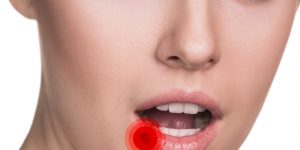
Canker sores may be a minor health issue, but they are annoying. Basically, they are small wounds that sting and ache when you drink, eat, or just swallow. They are also called aphthous ulcers, and are lesions that develop on the soft tissues of your mouth, or at the base of your gums. However, unlike cold sores, they do not occur on the surface of your lips, and are not contagious. But they definitely can be painful.
According to Sarah Glass, D.D.S., an assistant professor at Virginia Commonwealth University School of Dentistry, causes of canker sores differ from person to person. They are more common in women, and form usually on the tongue and the inside of the cheek. It can be caused by an unintentional bite, or an oral trauma. Nevertheless, nutrient deficiencies, stress, allergies, and hormonal shifts can bring them on.
Canker sores, although similar, are different from cold sores. Cold sores are contagious, and are caused by a virus. Canker sores do not spread. Having said that, if the lesion bothers you longer than 2 weeks, you should see a doctor. It may be a symptom of a more serious health condition such as Crohn’s disease, celiac disease, or even oral cancer.
Preventing canker sores
Basically, there are three simple ways to prevent canker sores:
Gently brush your teeth. Some canker sores are the result of forceful brushing of the teeth, gums, or tongue. And at times, it can also jab your cheek or lip with the hard part of the toothbrush. Glass recommends that you “Brush with small circular motions, and avoid aggressively brushing back and forth.”
Proper diet. Canker sores can happen if you are deficient in vitamin B, especially zinc and iron. Whole grains and produce will help, as well as B12-rich fish like rainbow trout, salmon, and tuna. Limit or avoid spicy food, as well as acidic food. Leena Palomo, D.D.S., associate professor at Case Western Reserve University School of Dental Medicine, explains, “Keep track of when sores occur and note foods that coincide with them to eliminate triggers specific to you.”
Avoid stress. Stress is thought to boost immune cells called leukocytes, which are linked to inflammation throughout the body, including in the mouth. They can trigger canker sores. Exercise, a nice hot bath, yoga, and meditation can help. “ Even a good night’s sleep can help,” Palomo says.
Treating canker sores
Topical anesthetics with benzocaine or lidocaine can numb the sores to relieve pain. Doctors can tell you whether a rinse, paste, or gel is best, depending on the location of the sores. Having said that, rinsing can help get rid of canker sores. A simple solution of ½ cup warm water and 1 teaspoon of baking soda can address the pain and quicken healing.Commercial rinses will also work, especially those with hydrogen peroxide. It will keep the ulcer clean. Also drink a lot of water, this will promote production of saliva, which will prevent viruses and bacteria. For severe cases, always consult the doctor. He may prescribe corticosteroids for the inflammation. Ask also about cauterization, which burns the ulcer with a chemical agent or laser. However, it has to be done by a specialist to protect the surrounding tissue.
So there you have it…how to prevent and get rid of canker sores.Simple steps that can save you a lot of trouble and pain.



